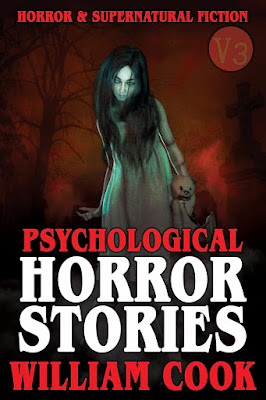"Psychological Horror Stories" by William Cook
Reviewed by Anthony Servante
The act of a fictional serial killer, or any killer, monster, or fiend, resides in the narrative choices the writer makes. In "Psychological Horror Stories" by William Cook, the narrators not only provide insight to the horrors but also personal traumas that shared with the reader. It is this perspective that gives the stories their psychological aspect. I want to make this clear because in "psychological" horror movies, we as viewers are caught between two perspectives: one, is the horror real, is it a real monster, per se; and two, is the horror all in the main character's head, is the monster a figment of her paranoia, for example. William Cook does not toy with such notions. His horror is real. Which is why he provides a "Trigger Warning" for readers. Expect to experience the horrors that the narrator experiences.
Let's take a peek at these experiences.
Hopeless – William Cook provides a narrator who describes the horrors of domestic abuse. Young Anne witnesses a brutal father destroy her family and must face life and death decisions if her family is to survive.Anomalous Perigee – Here we have a narrator who longs for lost love and measures what kind of life could follow. The most romantic story of the lot, although its horror cannot be minimized.
Dead Memories – The narrator begins with "the anniversary of her death." The "her" is Alicia who now haunts him as he goes through the routine of work and life. But even a repetitive routine can't hide the horror that his inner thoughts try to conceal.
Night Walker – The narrator that William Cook provides here is in love. His horror comes to us in the way he deals with this type of obsession.
The Dead Avenged – Donny Cox is our narrator who faces the horrors from bullying. Part supernatural, part coming-of-age story, the final story is a tale told by a traditional narrator in an otherly-world circumstance.
I've always enjoyed reading the works of William Cook. He doesn't shy away from real horror, that day-to-day terror and fear that waits for us as we go through our routines in life, that horror that we find in the most well-lit places of our lives. This is horror to be respected because it doesn't respect us. Whether we find it in at work, home, or school, these five stories present the reader with narratives that will pull readers into the horror that we sometimes avoid facing in real life. Here, there's no avoiding it.


